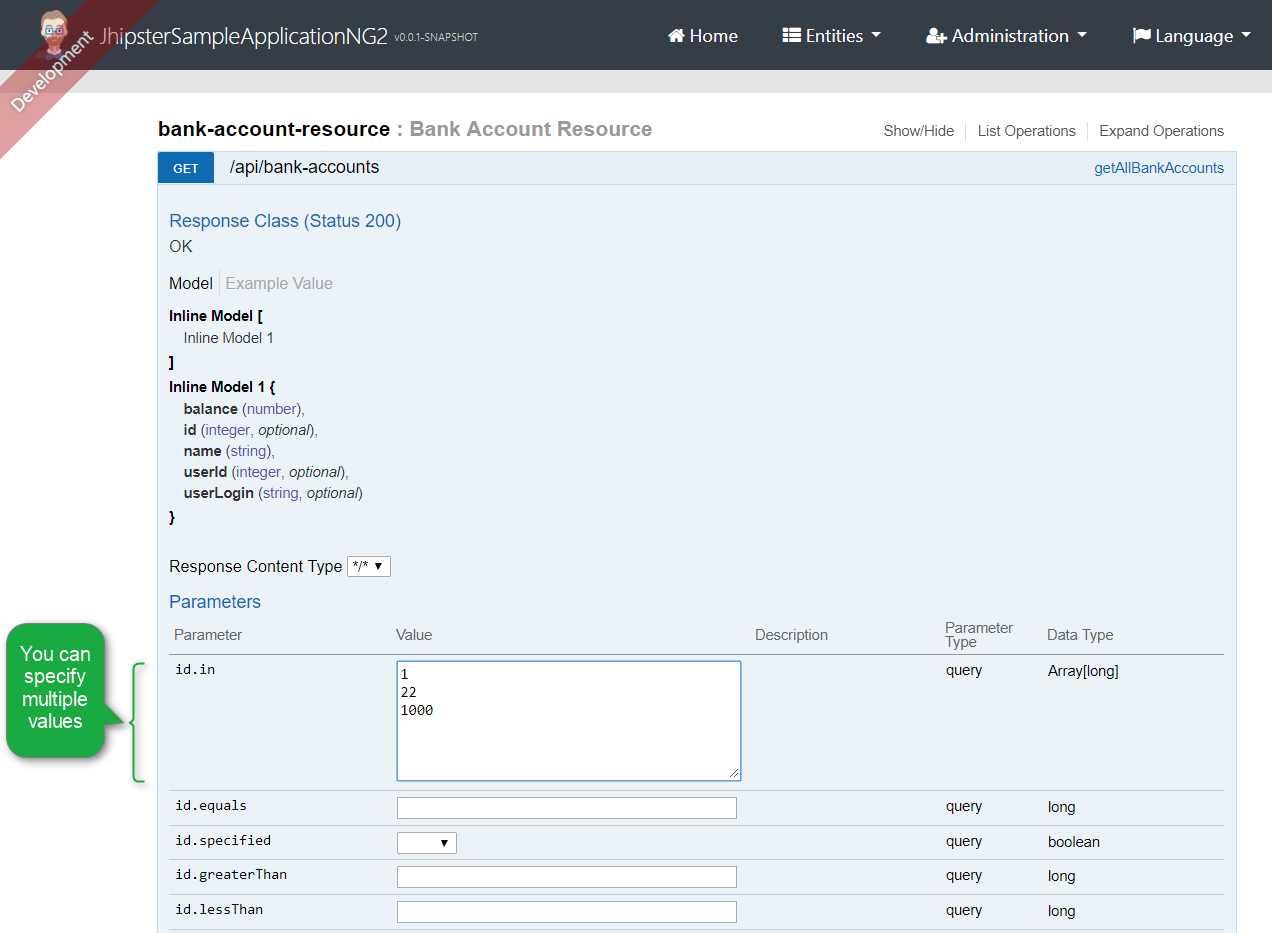Filtering your entities Permalink to " Filtering your entities"
Introduction Permalink to "Introduction"
After the basic CRUD functionalities are implemented for an entity, there is a very common request to create various filters for the attributes of the entity, so the server could be used more effectively. These filters should be sent as the request parameters, so any client - and any browser - could use it. Additionally, these filters should follow a reasonable, and concise pattern, and they must be allowed combining them freely.
How to activate Permalink to "How to activate"
Note: filter is not compatible with reactive.
When generating an entity with jhipster entity command, select services or service implementation to enable filtering on this entity.
If you want to enable filtering for existing entities, you can modify the entity configuration in your projects .jhipster directory, by setting service to serviceClass or serviceImpl from no, and jpaMetamodelFiltering to true and then re-generate with jhipster entity <entity name>.
When using JDL, add a line filter <entity name> to your JDL file and re-import the definitions with jhipster jdl command.
Public interface Permalink to "Public interface"
For each entity, you can enable filtering in the entity generator, and after, you can call your /api/my-entity GET endpoint with the following parameters :
- For each xyz field
- xyz.equals=someValue
- To list all the entities, where xyz equals to ‘someValue’
- xyz.in=someValue,otherValue
- To list all the entities, where xyz equals to ‘someValue’ or ‘otherValue’
- xyz.specified=true
- To list all the entities, where xyz is not null, specified.
- xyz.specified=false
- To list all the entities, where xyz is null, unspecified.
- xyz.equals=someValue
- If xyz’s type is string:
- xyz.contains=something
- To list all the entities, where xyz contains ‘something’.
- xyz.contains=something
- If xyz’s is either any of the number types, or the date types.
- xyz.greaterThan=someValue
- To list all the entities, where xyz is greater than ‘someValue’.
- xyz.lessThan=someValue
- To list all the entities, where xyz is less than ‘someValue’.
- xyz.greaterThanOrEqual=someValue
- To list all the entities, where xyz is greater than or equal to ‘someValue’.
- xyz.lessThanOrEqual=someValue
- To list all the entities, where xyz is less than or equal to ‘someValue’.
- xyz.greaterThan=someValue
They can be combined freely.
A good way to experience the expressiveness of this filter API is to use it from swagger-ui in the API docs page of your JHipster application.

Implementation Permalink to "Implementation"
When this feature is enabled, a new service named as EntityQueryService and an EntityCriteria is generated. Spring will convert the request parameters into the fields of the EntityCriteria class.
In the EntityQueryService, we convert the criteria object into a static, and type safe, JPA query object. For this, it is required that the static metamodel generation is enabled in the build. See the JPA Static Metamodel Generator documentation for details.
To prove that the generated criteria is working, and Spring is well configured, the EntityResourceIntTest is extended with lots of test cases, one for each individual filter.
Angular Permalink to "Angular"
When using Angular, the proper way to take advantage of this useful feature would look like this:
- Equals (same applies for
containsandnotEquals)this.bookService.query({'title.equals':someValue}).subscribe(...); - greaterThan (same applies for
lessThan,greaterThanOrEqualandlessThanOrEqualwhen usingdateandnumberdata types)this.bookService.query({'id.greaterThan':value}).subscribe(...); this.bookService.query({'birthday.lessThanOrEqual':value}).subscribe(...); - In (same applies for
notIn)this.bookService.query({'id.in':[value1, value2]}).subscribe(...); - Specified
this.bookService.query({'author.specified':true}).subscribe(...);
Limitations Permalink to "Limitations"
Currently only SQL databases (with JPA) is supported, with the separate service or separate service implementation/interface combination.